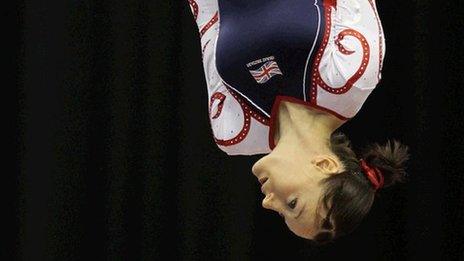Kat Driscoll puts spring in step of young trampolinists
- Published
London 2012 heptathlete Louise Hazel meets Britain's trampoline stars
Think of a sport where kids compete inside the same arena as Olympians - stand on the same podium, in front of the same crowd - just hours apart.
There are not many. Trampoline is one of them.
The recent British Championships took place inside Birmingham's LG Arena, where juniors could sit with family after their events and watch the UK's top trampolinists perform on the equipment they had just left. What better way to learn your sport and envisage what you could become?
"I love cheering them on. I just aspire to be like them - they're my idols," says Isobel Leigh-Warren, who won under-15 synchro trampoline gold earlier in the day. She is settling down to watch Kat Driscoll, who went to the London 2012 Olympics with Team GB, in the elite individual final.
"I'm really loud," adds Isobel, "so they always say 'Oh, I heard you cheering for me'."
Her trampoline partner, Corinne Clark, chips in: "We went to the Olympics and watched Kat. It's really cool how we can hang out and have a great laugh with her."
Not only do these girls get to watch Driscoll compete, they count themselves her friends. A few hours earlier they were all sat in the stands - Isobel and Corinne on either side of Driscoll - casually exchanging observations while watching other age groups in action.
"I remember being a kid," says Driscoll, 27, a world silver medallist in the sport. "Going to my first nationals and watching everyone, speaking to my idols, having photos with them, how good it felt.
"It's trying to remember how you felt when you were younger and make somebody feel how you did, or even better. It gives them a buzz and that really helped me when I was younger."
Trampoline is not everybody's first choice of sport to take into adulthood. You will not become a millionaire doing this for a living, the top end of the sport is made exceptionally tough by Chinese domination, and - more than anything - the name conjures up reckless bouncing in the back garden on summer afternoons, rather than performance sport.
But Driscoll and her synchro team-mate, Amanda Parker, have around 40 years of combined experience in the sport between them. How did they get into this?
"Both my parents were PE teachers. I started when I was four years old and have been doing it for 23 years now - I'm a little bit old in the sport but it doesn't stop me being successful," says Parker.
"My parents follow me all around the world to see me compete, I'm very lucky."
Driscoll did not even like trampolining when she first tried it, yet somehow has gone on to become one of the biggest British successes in the sport's history.
"In the half-term holidays, we went to our local leisure centre and did a week of activities," she recalls.
"I didn't really like it at first, it was one of those ones that you had to do. But the coach told my mum they thought I had something, so she brought me to the local club and I fell in love with it.
"When I went into the club environment and saw what everyone else was doing, I got the bug."
Back at the arena, Driscoll has already won the British synchro title with Parker; now, as the day nears an end, she is out to defend her individual title.
She will go on to finish second but that won't matter to Isobel, Corinne and their friend Brodie, poised in the rafters of the arena as Driscoll walks out to compete.
When their heroine's name is announced, three teenage voices cut through the applause: "Come on, Kat!"
Isobel turns and says: "At the Olympics the atmosphere was amazing, watching Kat. I really liked it. I just want to be on the trampoline with everyone cheering for me, that's what I want to happen when I'm older.
"I don't want to quit. I'd love to be known as an Olympian... and get the blue tick on Twitter.", external
- Published29 August 2014
